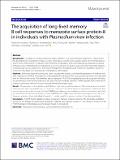The acquisition of long-lived memory B cell responses to merozoite surface protein-8 in individuals with Plasmodium vivax infection
Abstract
Background : The ability of a malaria antigen to induce effective, long-lasting immune responses is important for the development of a protective malaria vaccine. Plasmodium vivax merozoite surface protein-8 (PvMSP8) has been shown to be immunogenic in natural P. vivax infections and produces both cell-mediated and antibody-mediated immunity. Thus, PvMSP8 has been proposed as a vaccine candidate following fusion with other merozoite antigens in blood stage vaccine design. Here, the long-term responses of antibodies and memory B cells (MBCs) specific to PvMSP8 in individuals were monitored in a longitudinal cohort study. Methods : Both cross-sectional surveys and cohort studies were utilized to explore the persistence of antibody and MBC responses to PvMSP8. Antibody titers were detected in individuals with acute disease and those who recovered from an infection for 4 years. The dominant peptide epitope of PvMSP8 recognized by naturally acquired antibodies was examined to observe the durability of the post-infection antibody response. PvMSP8-specific MBCs were also in subjects 4 years post-infection using an enzyme-linked immunospot assay. Results : The prevalence of antibodies to PvMSP8 was high during and after infection. The antibody levels in individual responders were monitored for up to 12 months post-infection and showed that most patients maintained their seropositive response. Interestingly, the anti-PvMSP8 antibody responses stably persisted in some patients who had recovered from an infection for 4 years. Positive PvMSP8-specific MBCs were also detected at 4 years post-infection. However, analysis in these individuals showed no correlation with the presence or titer of circulating antibody. Conclusion : PvMSP8 had the ability to induce a long-term humoral immune response. The antibodies and MBCs specific for this antigen developed and persisted in subjects who acquired a natural P. vivax infection. Inclusion of the PvMSP8 antigen in blood stage vaccine design should be considered.
Citation
Kochayoo , P , Kittisenachai , N , Changrob , S , Wangriatisak , K , Muh , F , Chootong , P & Han , E-T 2019 , ' The acquisition of long-lived memory B cell responses to merozoite surface protein-8 in individuals with Plasmodium vivax infection ' , Malaria Journal , vol. 18 , 188 . https://doi.org/10.1186/s12936-019-2821-z
Publication
Malaria Journal
Status
Peer reviewed
ISSN
1475-2875Type
Journal article
Collections
Items in the St Andrews Research Repository are protected by copyright, with all rights reserved, unless otherwise indicated.

